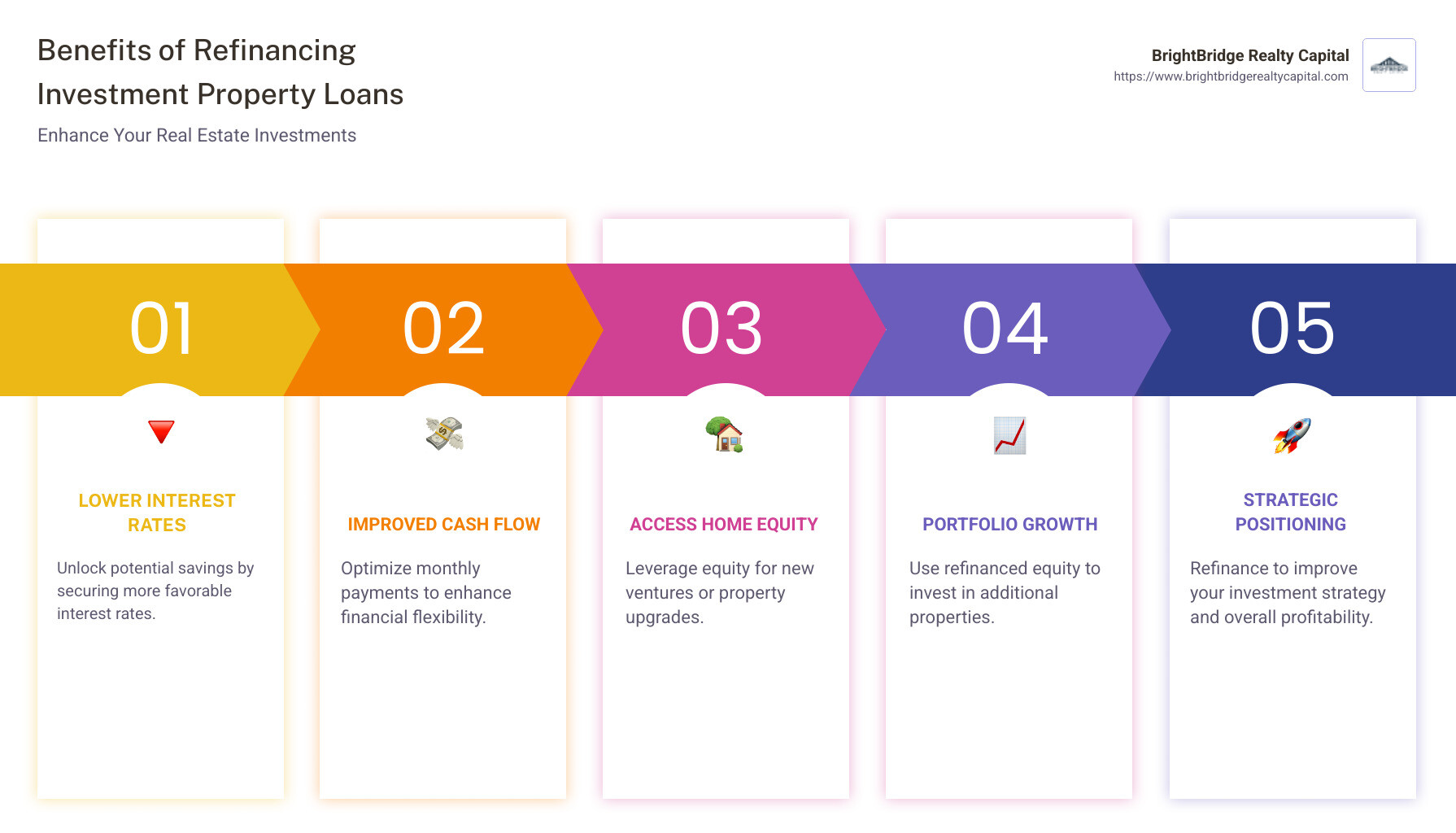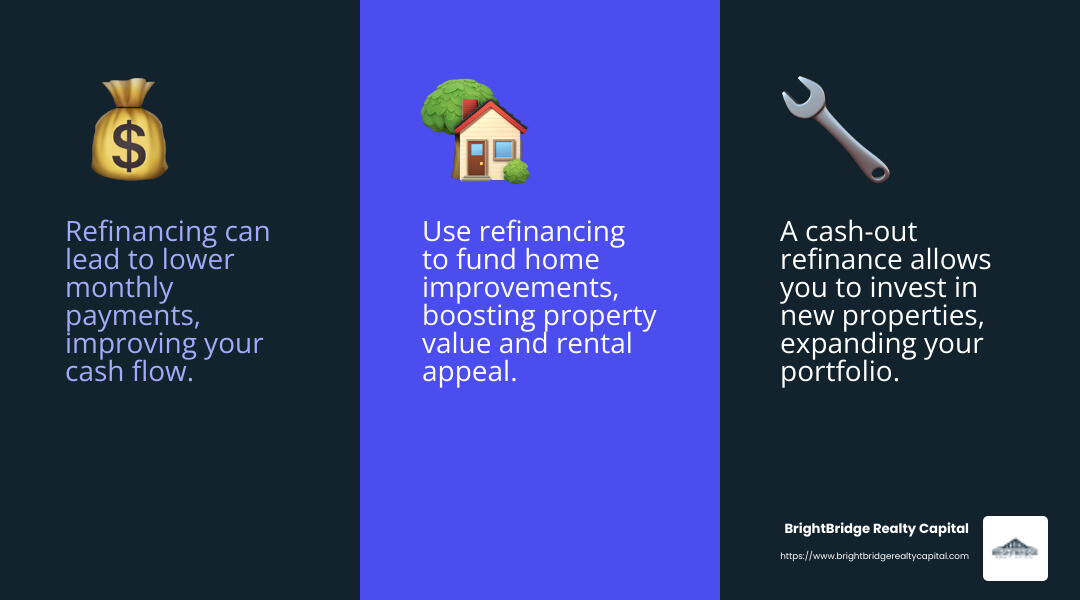Refinance and Reap: Strategies for Investment Property Loans

Refinancing investment property loan opens a door to smarter financial choices for real estate investors. By revamping your current loan, you might tap into opportunities that make your investments more profitable. Here's a quick look at why refinancing is beneficial:
- Lower Interest Rates: Potentially access better deals and save money.
- Better Cash Flow: Adjust your monthly payments for financial flexibility.
- Open up Home Equity: Use available equity for new investment ventures or property upgrades.
- Refinance for Growth: Expand your real estate portfolio by using equity to fund new properties.
When you refinance, you aren't just reshuffling numbers; you're strategically positioning yourself to improve profitability and growth. Whether you're looking to cut costs or fuel new investments, the benefits can be game-changers.

Infographic Description: A visual breakdown of refinance benefits, showing lower interest rates, cash flow improvements, equity open uping for investment, and opportunities for real estate portfolio growth.
Basic refinancing investment property loan vocab:
- financing a rental property
- creative financing for rental property
- how to get financing for a rental property
Understanding Refinancing Investment Property Loans
Refinancing an investment property loan can be a smart financial move, but it requires understanding a few key metrics: credit score, debt-to-income ratio, and loan-to-value ratio. Let's break these down.
Credit Score
Your credit score is crucial when refinancing. A higher score can secure you better interest rates, saving you money over time. Lenders typically look for a minimum score of 620, but aiming higher can provide more favorable terms.
.jpg)
Tip: Regularly check your credit report for errors and pay off small debts to boost your score before refinancing.
Debt-to-Income Ratio (DTI)
Your DTI ratio measures your monthly debt payments against your income. Lenders prefer a DTI of 36% or lower for investment properties. A lower DTI indicates you can handle new debt, making you a more attractive borrower.
Why it matters: A stable DTI can help you qualify for a refinance, ensuring you're not over-leveraged.
Loan-to-Value Ratio (LTV)
The LTV ratio compares your loan amount to your property's appraised value. For investment properties, lenders usually require an LTV of 75% or lower. This means you should have at least 25% equity in the property.
Example: If your property is worth $400,000, you should owe no more than $300,000 on your mortgage to meet the 75% LTV requirement.

Understanding these metrics will guide you in making informed decisions about refinancing your investment property loan. Each factor plays a role in determining your eligibility and the terms you might receive. Balancing these elements can lead to a successful refinance, open uping potential savings and investment opportunities.
Steps to Refinance Your Investment Property
Refinancing your investment property loan involves several key steps. Here's a simple guide to help you through the process.
1. Gather Documents
Before you start, collect all necessary documents. Lenders need proof of income, asset statements, and your current mortgage details. This includes:
- Proof of Income: Recent pay stubs or tax returns if you're self-employed.
- Asset Information: Bank statements and investment account details.
- Current Mortgage Statement: Shows your current loan balance and payment history.
Having these documents ready can speed up the process and keep things smooth.
2. Apply for Refinancing
Once your documents are in order, it's time to apply. Shop around to compare rates and terms from different lenders. Your current lender might offer favorable terms if you have a good standing relationship.
Tip: Don't rush. Take your time to find the best deal that fits your financial goals.
3. Lock Your Interest Rate
After your application is approved, you can lock in your interest rate. This ensures your rate won't change before closing. Rate locks typically last from 15 to 60 days.
Important: If you're happy with the proposed rate, lock it in quickly. If you're unsure, you can choose to "float" and lock later, but rates might change.
4. Underwriting
In this step, the lender verifies your financial information. They may request additional documents or ask questions about your finances. An appraisal of your property will also be done to determine its current market value.
Tip: Make sure your property is in good condition for the appraisal. A well-maintained property can positively impact its value.
5. Closing
Finally, it's time to close on your new loan. You'll receive a Closing Disclosure at least three business days before the meeting. This document outlines your new loan details and any closing costs.
During the closing, you'll sign all necessary paperwork. If it's a cash-out refinance, any funds owed to you will typically appear in your account shortly after closing.

By following these steps, you'll be well on your way to successfully refinancing your investment property loan. This process can open up new financial opportunities, whether you're looking to improve cash flow, expand your portfolio, or consolidate debt.
Benefits of Refinancing Investment Property Loans
Refinancing an investment property loan can open up a world of financial opportunities. Let's explore some of the key benefits:
Cash Flow Improvement
Refinancing can lead to lower monthly payments by securing a better interest rate or extending the loan term. This means more cash in your pocket each month. Imagine using this extra cash to reinvest in your property, pay down other debts, or simply boost your savings.

Portfolio Expansion
With a cash-out refinance, you can tap into the equity of your current property. This gives you the funds to invest in additional properties. Building a diverse portfolio can increase your rental income streams and spread out risk. It's like planting seeds for future financial growth.
Property Value Boost
Refinancing can provide the cash needed for property improvements. Upgrades like a new kitchen, fresh paint, or energy-efficient systems can make your property more appealing to renters. This not only increases your rental income but also boosts the property's market value.

New Mortgage Terms
Switching from an adjustable-rate mortgage to a fixed-rate mortgage can offer stability. Fixed rates mean predictable payments, which can simplify budgeting. Alternatively, shortening the loan term can save you money on interest over the life of the loan, even if your monthly payments are higher.
Debt Consolidation
Refinancing can also help consolidate high-interest debts. By rolling these debts into your mortgage, you may benefit from a lower overall interest rate. This strategy can simplify your finances and potentially save you money in interest payments over time.
Refinancing an investment property loan isn't just about lowering your interest rate. It's about leveraging your property to open up new financial possibilities. Whether you're aiming to improve cash flow, expand your portfolio, or improve your property's value, refinancing can be a powerful tool in your financial strategy.
Types of Refinancing Options
When considering refinancing an investment property loan, it's important to understand the two main types: rate-and-term refinance and cash-out refinance. Each option serves different financial goals and can impact your investment strategy in unique ways.
Rate-and-Term Refinance
A rate-and-term refinance involves changing the interest rate or loan term of your existing mortgage without altering the principal balance. This is a popular choice for investors looking to secure a lower interest rate or adjust the length of their loan.
Why choose a rate-and-term refinance?
Lower Interest Rates: If market rates have dropped since you took out your original loan, refinancing can reduce your monthly payments and overall interest costs.
Adjust Loan Term: You can either shorten your loan term to pay off your mortgage faster or extend it to lower your monthly payments.
Switch Mortgage Types: Transitioning from an adjustable-rate mortgage (ARM) to a fixed-rate mortgage can provide stability and predictability in your payments, which is especially valuable in a fluctuating market.
Cash-Out Refinance
A cash-out refinance allows you to take out a new mortgage for more than you owe on your property, pocketing the difference in cash. This option is ideal for investors who want to tap into their property’s equity.
Why consider a cash-out refinance?
Access Equity: Use the equity you've built up in your property to fund other investments, pay off high-interest debts, or cover major expenses like renovations.
Portfolio Expansion: The cash obtained can be used to purchase additional properties, diversifying and expanding your investment portfolio.
Property Improvements: Investing in property upgrades or repairs can increase rental income and boost property value, making it more attractive to potential tenants.
Both refinancing options offer unique advantages depending on your financial goals. Whether you're aiming to lower your interest rate, access cash for new investments, or improve your property's value, understanding these options can help you make informed decisions.
Frequently Asked Questions about Refinancing Investment Property Loans
Can You Refinance an Investment Property?
Yes, you can refinance an investment property. The process is similar to refinancing a primary residence, but there are additional requirements. Lenders typically require a minimum credit score of 620 and a maximum debt-to-income (DTI) ratio of 50%. Furthermore, you must have a loan-to-value (LTV) ratio of 70% to 75%, meaning you need at least 25% equity in your property.
The refinancing process involves several steps:
Gather Documents: Collect proof of income, proof of assets, a credit report, and a current mortgage statement. These documents help lenders assess your financial health.
Apply: Submit your application to a lender. Each lender has different criteria, so shopping around can help you find the best terms.
Lock Interest Rate: Once you apply, you can lock in your interest rate. This guarantees the rate for a certain period, typically 30 to 60 days, protecting you from rate increases before closing.
Underwriting: The lender verifies your documents and assesses the risk of refinancing your loan. They may require an appraisal to determine your property's current market value.
Closing: Sign the final documents and pay any closing costs. You'll receive a closing disclosure detailing all fees and costs.
How Often Can You Refinance?
You can refinance an investment property as often as it makes financial sense. There are no strict limits, but you should consider the break-even point. This is when the savings from refinancing equal the costs involved. If you plan to keep the property long enough to surpass this point, refinancing might be beneficial.
Each refinance involves closing costs, so calculate whether the interest savings outweigh these costs. If rates have dropped significantly since your last refinance, or if your financial situation has improved, it might be a good time to refinance again.
What Documents Do You Need to Refinance?
To refinance, you'll need to provide several key documents:
Proof of Income: Recent pay stubs, W-2 forms, or tax returns if you're self-employed.
Proof of Assets: Bank statements, investment account details, and retirement savings information.
Credit Report: A current credit report to verify your creditworthiness.
These documents help lenders evaluate your ability to repay the loan and assess the risk associated with refinancing your investment property. Having these documents ready can speed up the process and increase your chances of approval.
Conclusion
Refinancing an investment property loan can be a powerful strategy to align your financial goals with market opportunities. Whether you're looking to improve cash flow, expand your real estate portfolio, or improve property value, the right refinancing strategy can make a significant difference.
At BrightBridge Realty Capital, we focus on providing customized and quick financing solutions for real estate investors. Our expertise in direct lending means you can expect competitive rates and fast closings, often within a week. This speed and flexibility can be crucial when timing is everything in real estate investments.
Why Choose BrightBridge Realty Capital?
- Fast Closings: Get your refinance done quickly, allowing you to seize market opportunities without delay.
- Direct Lending: Enjoy competitive rates without the hassle of intermediaries.
- Nationwide Reach: No matter where your investment properties are, we can help.
Refinancing isn't just about securing a lower interest rate. It's about crafting a strategy that supports your broader financial goals. Whether you're consolidating debt, funding another investment, or simply improving your property's value, refinancing can be the key to open uping new potential.
If you're considering refinancing your investment property, explore our loan options to find a solution that fits your needs. Let us help you steer the refinancing process with ease and confidence.
Achieving your financial goals is within reach, and we're here to help you every step of the way.


